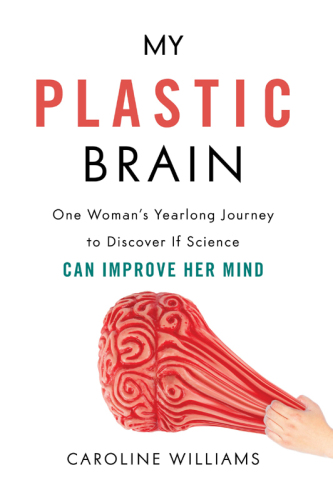
My Plastic Brain
One Woman's Yearlong Journey to Discover If Science Can Improve Her Mind
فرمت کتاب
ebook
تاریخ انتشار
2018
نویسنده
Caroline Williamsناشر
Prometheus Booksشابک
9781633883925
کتاب های مرتبط
- اطلاعات
- نقد و بررسی
- دیدگاه کاربران
نقد و بررسی

January 1, 2018
Science journalist Williams peers into her own mental skills and limits in this somewhat scientifically conservative overview of human neuroplasticity. She spends a year traveling to laboratories, talking to experts, and experiencing various methods to improve brain performance. Williams uses a well-established approach to first-person narrative reporting: trying things out on herself. Discarding both the discredited idea of improving general brain health through training puzzles and the idea of focusing on structural changes rather than functional ones, Williams pinpoints specific executive function skills to address, such as reducing anxiety and directing attention. Her trials are primarily lab experiences, including physical brain stimulation of the prefrontal cortex to enhance creativity and transcranial random noise stimulation to enhance number skills. A belt that buzzes in the direction of magnetic north, to help train navigation circuits, gets a real-world trial. Williams hones her approach as she learns, discovering that “to build brainpower, it’s not muscle you want, it’s flexibility.” Some chapters include boilerplate advice to exercise, “practice navigating in unfamiliar territory,” and “do some easy math” to keep from getting rusty. Williams is a relatable guide, but readers looking to glean practical advice may find her recommendations uninspiring. Illus.

February 1, 2018
A British science writer uses her own brain to explore what researchers have been working on and to discover how her own shortcomings might be overcome.In her debut book, Williams, a consultant for New Scientist magazine and a contributor to the BBC and the Guardian, asks whether recent advances in technology can improve some of her cognitive abilities. She chose six specific areas of focus--attention, anxiety, creativity, navigation, time perception, and number sense--each of which is currently receiving intensive study by neuroscientists and psychologists, in order to understand how performance can be improved. Among other places, the author's research travels took her to centers in Boston, Philadelphia, and Lawrence, Kansas, in the United States, Oxford and Keele universities in England, and Ghent University in Belgium. She briefly profiles the researchers and chronicles her informative interviews with them, also noting her personal experiences with whatever system they were working on. The conditions of Williams' participation vary, and so do the results, often displayed in simple charts and diagrams that add little to the text except perhaps a slight scientific air. Readers hoping to improve their own cognitive abilities may feel a bit of a letdown by the author's old-fashioned, down-to-earth advice: exercise your body, preferably outdoors, learn mindful meditation but also allow your mind to wander, engage in a mentally challenging hobby, and pick the skill you want to improve and practice it in real life. In the concluding chapter, Williams reports that the world of neuroscience is "teetering on the brink of a new world," and based on the advances already underway, the future is likely to be full of technological innovations that may well enhance one's brain power.An easy-to-read journey through the world of brain research that gives a glimpse of what is happening there, all done with a highly personal touch.
COPYRIGHT(2018) Kirkus Reviews, ALL RIGHTS RESERVED.

March 1, 2018
In the vein of a yearlong self-improvement project, science journalist (New Scientist, BBC, the Guardian) Williams's first book focuses on enhancing how her brain functions via neuroscience. Her main complaints are a tendency to fret, particularly about her young son's safety; procrastination; and a tendency to "space out" (which she calls "butterfly brain"). The author often writes at home, and being able to focus is key. In order to find out if neuroscience can help change her brain, she worked with researchers across Europe and the United States, trying out such techniques as sustained focus exercises, stress response retraining, mindfulness meditation training, and magnetic brain stimulation. Williams reports her experience and progress (or lack thereof), ever cognizant that much of this work is still in its nascent stages and therefore unavailable outside controlled studies. In a charming and engaging voice, Williams takes readers on a thorough, thoughtful tour of the current state of the practical applications of neuroscience and looks at what the future holds. VERDICT Highly recommended for readers interested in the brain and the various methods on the market to improve it.--Nancy H. Fontaine, Norwich P.L., VT
Copyright 2018 Library Journal, LLC Used with permission.

























دیدگاه کاربران